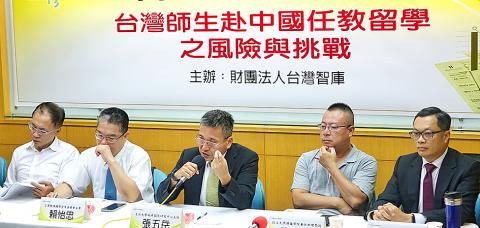Academics yesterday expressed concern about a growing number of Taiwanese studying in China, calling on the government and the public to beware of Chinese policies specifically favoring Taiwanese students.
The number of Taiwanese who have gone to China to study has risen for three consecutive years from 2,183 in 2015 to 2,567 last year, Mainland Affairs Council data showed.
While not a marked increase, the government and the public should beware of the growing trend at a time when schools nationwide are struggling to recruit students, as China’s courting of Taiwanese students is now happening not just at the university level, but also at the high-school level, Tamkang University Graduate Institute of China Studies associate professor Chang Wu-ueh (張五岳) told a news conference held by Taiwan Thinktank in Taipei.

Photo: Liu Hsin-de, Taipei Times
Some Chinese high schools that are considered prestigious have set aside slots for Taiwanese students, who are given priority, he said.
Many leading Chinese universities have introduced preferential admittance regimes for Taiwanese students, evidenced by students scoring an average of 45 in the government-administered General Scholastic Ability Test for university admittance — which uses a 75-point system — being admitted to three top Chinese schools last month, he added.
Students who aim to earn a medical degree in China, which is relatively easier than in Taiwan, should bear in mind that the Physicians Act (醫師法) would bar them from practicing in Taiwan, Chang said.
While studying in China might help people gain a better understanding of Chinese society and prevalent Chinese views on cross-strait relations, it does not seem to have any influence on their political beliefs or their identification with their home nation in the short term, he said, citing “at least 12 studies.”
Since Beijing in February introduced 31 measures to attract Taiwanese to work or study in China, several Chinese municipalities have followed up with their own versions, most of which involve providing cash through various channels, Taiwan Thinktank researcher Tung Li-wen (董立文) said.
Such policies are absurd and counterproductive to promoting cross-strait ties, as they put Taiwanese in a privileged class and discriminate against Chinese, he said.
Citing his observations as a former exchange student in China, National Taiwan University graduate student Lin Tzu-yao (林子堯) said that while allowing mediocre Taiwanese students admittance to prestigious Chinese institutions is tempting, the practice is divisive, as it causes hostility by Chinese students toward Taiwanese.
Some classmates who were interested in studying in China took the next flight home after seeing the poor conditions in the dorms at some universities, he said.
Academic freedoms, especially in social studies, are restricted at Chinese universities, where discussion of the Tiananmen Square Massacre remains taboo, he added.
Students who want to use Chinese diplomas as a springboard to higher-ranked US institutions are likely to achieve the opposite effect, as US President Donald Trump’s administration has taken a stricter approach when screening Chinese students out of concern for possible theft of US technologies, Lin said.

SECURITY: As China is ‘reshaping’ Hong Kong’s population, Taiwan must raise the eligibility threshold for applications from Hong Kongers, Chiu Chui-cheng said When Hong Kong and Macau citizens apply for residency in Taiwan, it would be under a new category that includes a “national security observation period,” Mainland Affairs Council (MAC) Minister Chiu Chui-cheng (邱垂正) said yesterday. President William Lai (賴清德) on March 13 announced 17 strategies to counter China’s aggression toward Taiwan, including incorporating national security considerations into the review process for residency applications from Hong Kong and Macau citizens. The situation in Hong Kong is constantly changing, Chiu said to media yesterday on the sidelines of the Taipei Technology Run hosted by the Taipei Neihu Technology Park Development Association. With

CARROT AND STICK: While unrelenting in its military threats, China attracted nearly 40,000 Taiwanese to over 400 business events last year Nearly 40,000 Taiwanese last year joined industry events in China, such as conferences and trade fairs, supported by the Chinese government, a study showed yesterday, as Beijing ramps up a charm offensive toward Taipei alongside military pressure. China has long taken a carrot-and-stick approach to Taiwan, threatening it with the prospect of military action while reaching out to those it believes are amenable to Beijing’s point of view. Taiwanese security officials are wary of what they see as Beijing’s influence campaigns to sway public opinion after Taipei and Beijing gradually resumed travel links halted by the COVID-19 pandemic, but the scale of

A US Marine Corps regiment equipped with Naval Strike Missiles (NSM) is set to participate in the upcoming Balikatan 25 exercise in the Luzon Strait, marking the system’s first-ever deployment in the Philippines. US and Philippine officials have separately confirmed that the Navy Marine Expeditionary Ship Interdiction System (NMESIS) — the mobile launch platform for the Naval Strike Missile — would take part in the joint exercise. The missiles are being deployed to “a strategic first island chain chokepoint” in the waters between Taiwan proper and the Philippines, US-based Naval News reported. “The Luzon Strait and Bashi Channel represent a critical access

Pope Francis is be laid to rest on Saturday after lying in state for three days in St Peter’s Basilica, where the faithful are expected to flock to pay their respects to history’s first Latin American pontiff. The cardinals met yesterday in the Vatican’s synod hall to chart the next steps before a conclave begins to choose Francis’ successor, as condolences poured in from around the world. According to current norms, the conclave must begin between May 5 and 10. The cardinals set the funeral for Saturday at 10am in St Peter’s Square, to be celebrated by the dean of the College